PETALING JAYA: The Covid-19 pandemic and its association with the consumption of exotic meat have given wildlife, including endangered species, a small reprieve.
According to wildlife experts, wild animals now have a freer rein in their jungle habitat as hunting goes on the decline. However, smuggling of these animals continues in many countries, including Malaysia, as the demand for their meat has not fully dried up.
Former Zoo Negara assistant director and chief veterinarian Datuk Dr Vellayan Subramaniam told theSun that there has been a drop in the sale of exotic meat in the market.
“People are becoming more aware of the hazards of eating exotic meat and the diseases that may come with it,” he said.
Vellayan, who is now associate professor at Universiti Teknologi Mara, said smuggling of certain species of wild animals continues despite a drop in the procurement of exotic meat.
“For instance, the smuggling of pangolin in Peninsular Malaysia and turtles in Sabah remains active.
“In Malaysia, the wild animals that make it to the dinner plate are the Malayan Tiger, Sun Bear, wild boar, bats, monkey, civet, pangolin, tree shrew, flying fox, python, monitor lizard, squirrel and crocodile,” Vellayan said.
In a recent survey conducted jointly by World Wide Fund for Nature and public opinion research consultancy GlobeScan, 32% of those interviewed cited the consumption of wild animals as the primary cause of Covid-19, and another 27% see it as a secondary factor.
The survey covered five countries – China, the United States, Myanmar, Vietnam and Thailand.
Wild animals are at great risk in many countries. Vellayan said that in places such as Cambodia, smugglers are aided by the police and army. There are also smugglers from Thailand and Cambodia holed up in the Malaysian forest.
He said wild animals are also being hunted for medicinal purpose and, as a result, the wildlife population is on the decline.
Vellayan said as human activities ease because of the Covid-19 pandemic, wild animals are now wandering along the fringes of jungles and even urban centres, and many end up as victims of roadkill.
According to Department of Wildlife and National Parks Director-General Datuk Abdul Kadir Abu Hashim, the decline in consumption of exotic meat began with the enforcement of the first movement control order in March last year.
“The subsequent implementation of travel restrictions also helped reduce licensed and illegal hunting of wildlife.”
Kadir said studies have shown that a majority of the world’s population, including Malaysians, are already aware of the theory that the coronavirus is transmitted through the ingestion of exotic meat.
“However in Malaysia, diseases that may have been caused by consuming wild animals have not been identified.
“Illegal wildlife hunting and smuggling must be addressed through enforcement at hotspot regions and across national borders in order to break the chain of exotic meat as a food source.”
He said there must also be public education and awareness campaigns.
“This initiative should be aimed at local communities living in wildlife habitat areas, vendors who provide exotic meat to restaurants and traditional medicine producers.”









